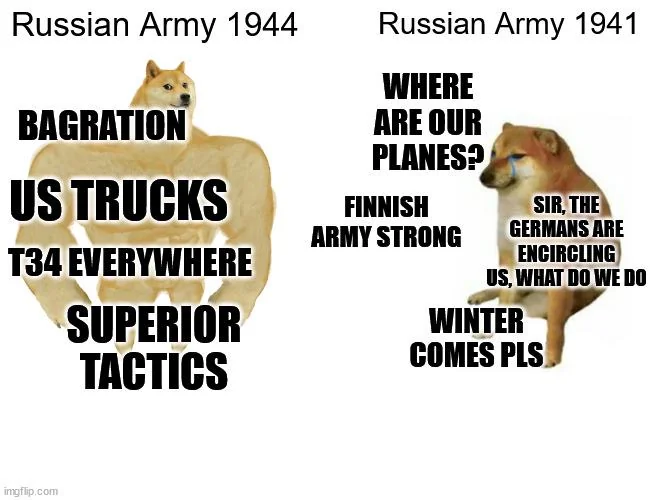this post was submitted on 09 Feb 2025
66 points (90.2% liked)
A Comm for Historymemes
1904 readers
519 users here now
A place to share history memes!
Rules:
-
No sexism, racism, homophobia, transphobia, assorted bigotry, etc.
-
No fascism, atrocity denial, etc.
-
Tag NSFW pics as NSFW.
-
Follow all Lemmy.world rules.
Banner courtesy of @[email protected]
founded 2 years ago
MODERATORS
you are viewing a single comment's thread
view the rest of the comments
view the rest of the comments

Soviet deep battle was well-developed and, perhaps more importantly, well-practiced by 1944. After Stalingrad was over, the idea of Soviet forces using 'meat waves' is a popular, but incorrect presumption. The Soviets were running short on manpower (without resorting to the kind of insane gambits that Nazi Germany was at the same time during the war) in 44 and 45, so they had every incentive to be (relatively) sparing about their troops, even if their tolerance for losses was still much higher than we would regard as acceptable today.
Acceptable today by whose standards, though? The russian army is literally doing meatwave tactics these days...
It's curious - when that started happening, I remember a few folks online musing that Russia had undone years of work by historians fighting the pop culture myth of Soviet 'human wave' tactics.
But the Russian Federation isn't known for its... well, for its anything but corruption and incompetence.
I've never understood how bagration has been considered operational art. They advanced roughly 10km per day for the same daily casualties as Paschendale (though casualty numbers varies). If any other participant in the second world war would have such a slow advance at such a cost of life it would be considered a strategic disaster. Especially considering the material superiority the Soviets enjoyed at the time.
10km a day is extremely fast against a dug-in foe before mechanized infantry were the standard. And they were operating with about double the troop numbers, on both sides, that were involved in Paschendale.
Combat casualties between the Sovs and the Nazis were roughly equal - when on the offensive in modern combat, that's a good sign. Bagration, furthermore, completely broke the Nazi army on the eastern front, and forced it into a humiliating, and ultimately war-ending, retreat.